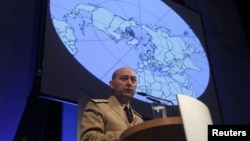BRUSSELS —
The commander of all NATO forces says the Taliban is under significant military pressure, designed in part to motivate its leaders to reach a political settlement with the Afghan government. In an interview, U.S. Navy Admiral James Stavridis told VOA that, despite recent problems, he is more optimistic now than he was a few years ago that Afghanistan will be stable when allied forces end their combat role, in a little more than two years.
Admiral Stavridis has long described himself as "cautiously optimistic." But now, despite an apparent increase in Taliban activity and an epidemic of killings of allied troops by their Afghan partners, he says he feels a bit more optimistic.
"I'm actually more optimistic than I was at that time," he said. "And, I'll give you another metric that I think is very encouraging - casualties, which are devastating, every one of them individually.
"But I'm very happy to say that our casualty levels are down about 30 percent in the coalition compared to this time last year," continued Admiral Stavridis. "Why is that? It's because the Afghan security forces are in the lead."
And, he says Afghan security forces casualties are up about 30 percent as a result.
The admiral says allied forces have put a series of measures in place to try to guard against insider attacks, including stricter vetting procedures and tighter security during joint operations. And, officials say the joint patrols that were partly suspended a few weeks ago have mostly resumed.
"I'm very, very content that we have seized this challenge and will deal with it," said Admiral Stavridis. "And, it will not knock this campaign off course."
The focus of allied operations is on preparing the 350,000-strong new Afghan security forces to handle the situation on their own after most foreign forces leave at the end of 2014. At the same time, the NATO command and Afghan forces are attacking the Taliban to reduce its capabilities and convince its leaders to negotiate a political settlement with the Afghan government.
At London's Royal United Services Institute, Director Michael Clarke says the key is to ensure that after the foreign troops leave there is not more violence than the Afghan government forces can handle.
"I'm confident that NATO will leave behind a system and a structure that has a reasonable chance of working," said Clarke. "Whether it works or not will depend upon whether it's subjected to a really strong pressure. If the Taliban are able to exert real pressure on the system, then I'm not so sure it will stand."
For now, with more than 100,000 allied forces still in Afghanistan, Admiral Stavridis is more concerned about putting pressure on the Taliban.
"I think there's a lot of pressure on the insurgency," he said. "And, I think the more pressure that we put on the insurgency, the higher the likelihood of eventual political settlement in this dispute."
So far, peace talks have been rare and unsuccessful. But analysts say, if the Afghan government forces continue to get better and the allies continue to pound the Taliban, prospects for a settlement could improve as the deadline for withdrawing most foreign troops gets closer.
Admiral Stavridis has long described himself as "cautiously optimistic." But now, despite an apparent increase in Taliban activity and an epidemic of killings of allied troops by their Afghan partners, he says he feels a bit more optimistic.
"I'm actually more optimistic than I was at that time," he said. "And, I'll give you another metric that I think is very encouraging - casualties, which are devastating, every one of them individually.
"But I'm very happy to say that our casualty levels are down about 30 percent in the coalition compared to this time last year," continued Admiral Stavridis. "Why is that? It's because the Afghan security forces are in the lead."
And, he says Afghan security forces casualties are up about 30 percent as a result.
The admiral says allied forces have put a series of measures in place to try to guard against insider attacks, including stricter vetting procedures and tighter security during joint operations. And, officials say the joint patrols that were partly suspended a few weeks ago have mostly resumed.
"I'm very, very content that we have seized this challenge and will deal with it," said Admiral Stavridis. "And, it will not knock this campaign off course."
The focus of allied operations is on preparing the 350,000-strong new Afghan security forces to handle the situation on their own after most foreign forces leave at the end of 2014. At the same time, the NATO command and Afghan forces are attacking the Taliban to reduce its capabilities and convince its leaders to negotiate a political settlement with the Afghan government.
At London's Royal United Services Institute, Director Michael Clarke says the key is to ensure that after the foreign troops leave there is not more violence than the Afghan government forces can handle.
"I'm confident that NATO will leave behind a system and a structure that has a reasonable chance of working," said Clarke. "Whether it works or not will depend upon whether it's subjected to a really strong pressure. If the Taliban are able to exert real pressure on the system, then I'm not so sure it will stand."
For now, with more than 100,000 allied forces still in Afghanistan, Admiral Stavridis is more concerned about putting pressure on the Taliban.
"I think there's a lot of pressure on the insurgency," he said. "And, I think the more pressure that we put on the insurgency, the higher the likelihood of eventual political settlement in this dispute."
So far, peace talks have been rare and unsuccessful. But analysts say, if the Afghan government forces continue to get better and the allies continue to pound the Taliban, prospects for a settlement could improve as the deadline for withdrawing most foreign troops gets closer.











